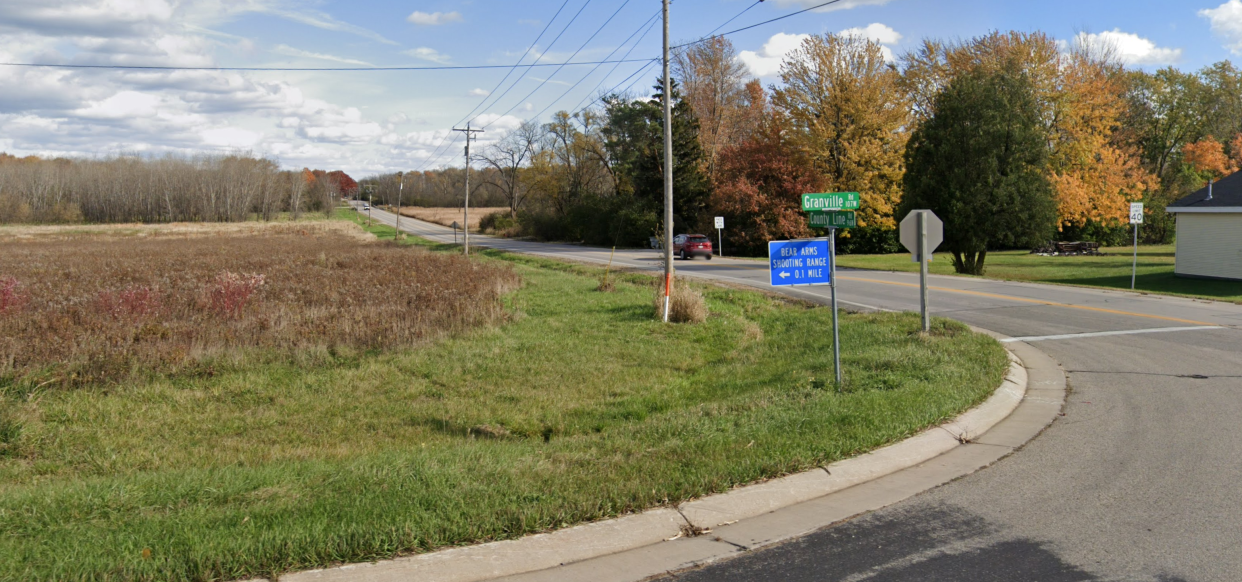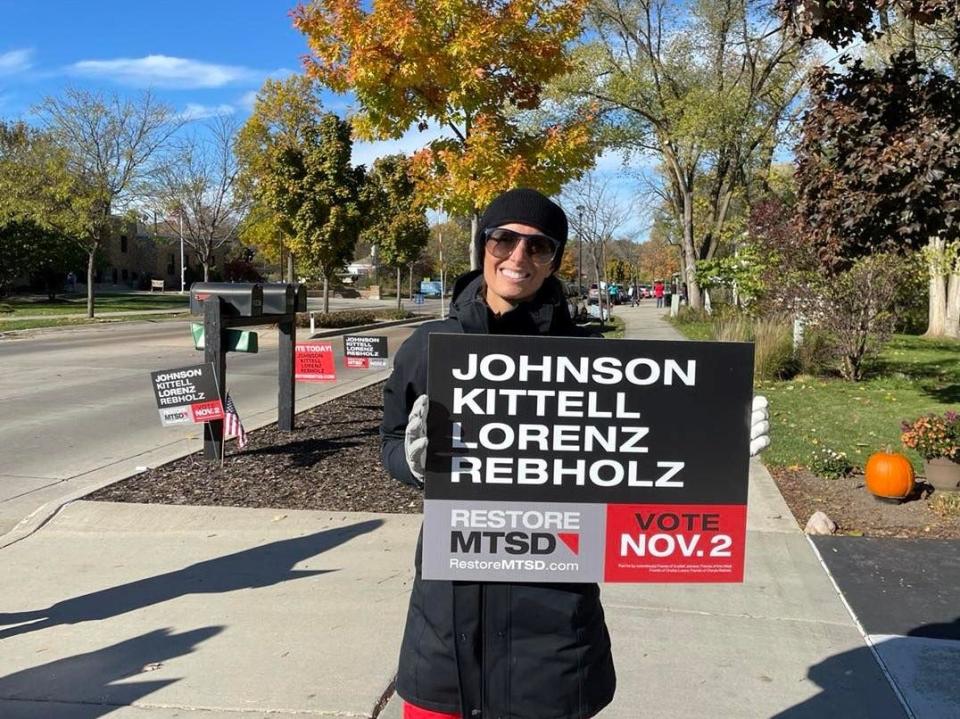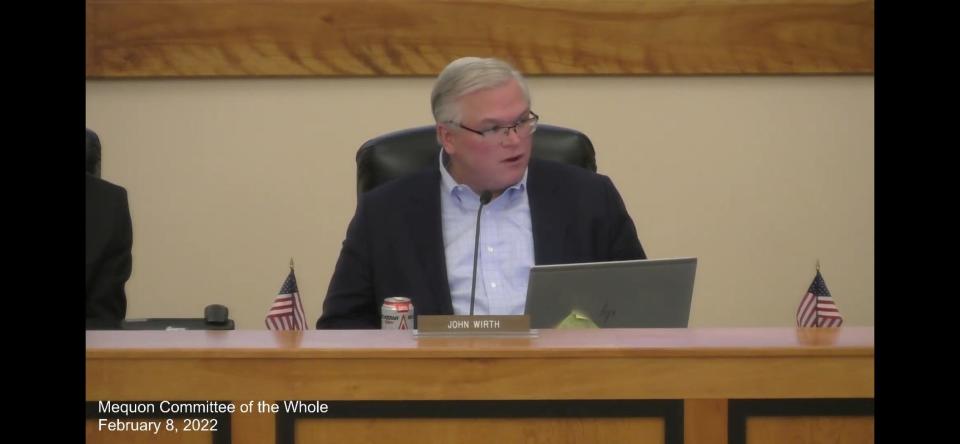Mequon residents can pay a fee for the city to install blue signs in designated public areas after officials approve new ordinance

Mequon officials have approved a new sign code ordinance that prohibits signs at the city’s Gateway Monument near Cedarburg and Mequon roads, but allows residents to pay a fee to install blue signs with whatever message they want at designated sites.
Signs will only be limited on the size of the message, said City Attorney Brian Sadjak.
"You're not going to be able to put the full text of the Constitution, for example, on the sign because it's just not going to fit," Sadjak said. "But beyond the size limitations, there's no limitations on what can be on it."
The school board recall election led the city to evaluate its enforceable regulations related to signs on public property, according to a memo from Sadjak to the council.
Daniel Lennington, an attorney with the Wisconsin Institute for Law & Liberty, warned the city in August 2021 that its laws violate the First Amendment during demonstrations led by the Mequon-Thiensville School Board recall group.
More Mequon news: Alderman files new open records lawsuit against Mequon-Thiensville School District
More: Four candidates advance to April general election in Mequon-Thiensville School Board race
Potential lawsuit
Last year, Lennington sent a letter to Mequon Mayor John Wirth threatening a lawsuit against the city for its attempts to enforce a sign ordinance against a group of school board recall organizers.
Amber Schroeder, Lennington’s client and a member of the Mequon-Thiensville School District recall group, was asked to remove the group's banners several times by police near the Mequon Pool and also near Metro Market on Port Washington Road.

“Police officers on at least four occasions have made contact with my client asking her to take down the sign,” Lennington said in the letter. “She has complied every time. The officers have said they are asking that the sign be taken down based on an order from Mayor Wirth. On the last occasion, the Mequon police officer told Ms. Schroeder to take down the sign, and that if she put up the sign again, the officer would issue a citation.”
In the letter, Lennington said the city’s ordinance bans all banners not authorized by officials.
“Prior restraints like this are presumptively unconstitutional, unless the city provides procedural safeguards, which it does not in this case,” he said in the letter.
The letter also cited the city’s content-based exceptions to the ordinance, which include: certain wall signs, bulletin boards, memorial signs or tables, building name signs, traffic signs, legal notices, signs identifying farm operations, certain flags or banners (specifically, only those which represent the United States, State of Wisconsin, Ozaukee County or the city), directional signs, interior signs, yard sale signs and others.
In the letter, Lennington referenced the U.S. Supreme Court decision in the Reed v. town of Gilbert case in Arizona. In that case, the town restricted the size, duration and location of temporary directional signs, he said.
“In striking down the ordinance, the court held that the ordinance was not content neutral because it treated signs differently based on the ‘communicative content of the sign,’” Lennington said in the letter. “The City of Mequon has not updated its ordinance since this decision in 2015.”
'Fair and open to everybody'

During a Feb. 8 committee of the whole meeting, Mequon Mayor John Wirth said the city’s ordinance should be fair and open to everybody.
“We allowed these (signs) discretionarily,” Wirth said at the meeting. “We turned some down, we approved some; we tended not to have these signs. There were a few exceptions. Now we’re giving people the right to have it, which is actually a more expansive right than what we currently have. The question is how many of them do we want around the city?”
Under the new ordinance, the city will install a sign in the street reserved area for any person or entity, for any purpose and with any message, subject to specific sites and conditions.
Signs can be installed at the following locations:
County Line Road (north side)
Donges Bay Road
Mequon Road (west of Buntrock Avenue; between the Milwaukee River and Oriole Lane; east of I-43)
Freistadt Road
Highland Road
Bonniwell Road
Pioneer Road
Wasaukee Road
Granville Road
Swan Road
Wauwatosa Road
Cedarburg Road (south of Lucerne Court; north of Thiensville)
Green Bay Road
Port Washington Road (north of Glen Oaks Lane)
Lake Shore Drive
The ordinance limits signs to one per person or entity. Signs will be installed at the expense of the person requesting the sign, and will be subject to an annual administrative fee. The city will place signs facing the same street at least a half-mile apart. Sign fees have not yet been established.
The ordinance also honors existing signs, stating they may remain in place through 2026, "provided the person or entity for which the sign was installed pays the annual administrative fee when required."
Laws and ordinances could change
“This is exactly what I was hoping you’d come forward with,” Ald. Robert Strzelczyk said at the meeting. “There’s a lot to this. We want to make sure resident rights are respected and free speech is respected, but we also want to be able to conduct city business.”
Ald. Andrew Nerbun said during the meeting said the process has been frustrating, but the ordinance "might be perfectly balanced for now, and we can always continue to assess as we move forward."
"We may get challenged," said Nerbun. "We may have to adjust. Case law might change as the city attorney pointed out, but balancing not wanting to have the proliferation of signs in a free area, it was problematic for many. It got lots of complaints from citizens at large not wanting more signs. I think this is a good compromise."
Nerbun also pointed out that the city could amend the ordinance "or get rid of it in the future if the situation gets out of control or if some of the signs end up being ridiculous."
Sadjak said in an interview that the blue signs are open to anybody who’s willing to pay the annual fee.
Will sign topics be limited?
Sadjak said there will be no limitations on what can be on signs.
“Folks are going to have different sensibilities to begin with,” he said. “There’s always the question of is it truly offensive or not? But certainly the more direct answer to the question is there really are no limitations.
"I’m sure at some point there might be something that’s just so clearly offensive that the city may take action. But I just can’t picture what that would be in light of, I mean, there’s no images that are associated with that. It’s just text. So it’s hard for me to imagine what that potentially might be.”
Lennington said in an email that sign ordinance enforcement could still violate the First Amendment, and the Wisconsin Institute for Law & Liberty will continue to monitor Mequon’s compliance.
“So long as the city is not drawing distinctions between messages conveyed by private parties, they will have cured the problem presented by their previous ordinance, which allowed some private messages on public property, but not others,” he said.
Sadjak said told officials during the meeting that First Amendment law is an area of law that is “evolving and changing fairly frequently.”
“This particular version of the code, I will tell you, does lean heavily into the concept of government speech, which is an area of First Amendment law that is about as confusing as the rest of First Amendment law,” he said.
Eddie Morales can be reached at 414-223-5366 or eddie.morales@jrn.com. Follow him on Twitter at @emoralesnews.
Our subscribers make this reporting possible. Please consider supporting local journalism by subscribing to the Journal Sentinel at jsonline.com/deal.
DOWNLOAD THE APP: Get the latest news, sports and more
This article originally appeared on Milwaukee Journal Sentinel: Mequon officials change sign ordinance after lawsuit threat

